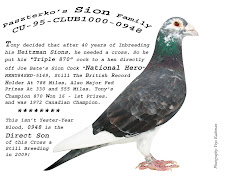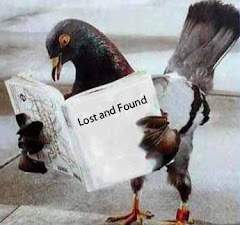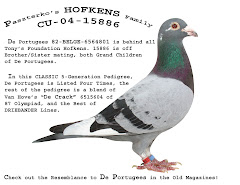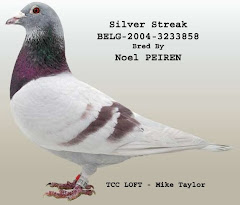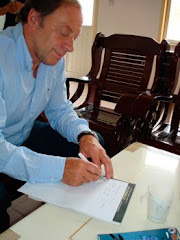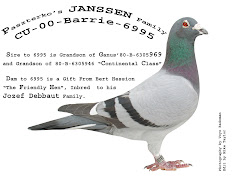Winnipeg Free Press - PRINT EDITION
By: Bartley Kives
01/18/2011
Radio-frequency chips, GPS used to track birds
Bird breeders Ken van Walleghem and Bill Voulgaris display a thoroughbred racing pigeon.
TREVOR HAGAN / WINNIPEG FREE PRESS
Fans of the centuries-old sport of pigeon racing now rely on information-age technology to count their birds as soon as they fly home to roost.
Radio frequency chip-embedded leg bands and GPS technology have revolutionized the seemingly arcane, steam-age sport by freeing up enthusiasts from the mundane task of having to constantly monitor their coops to note the precise time pigeons return home from distant races.
Pigeon racing, which dates back to 19th-century Belgium, involves the release of specially trained thoroughbred pigeons hundreds of kilometres from their coops and noting which birds fly home the fastest.
Winnipeg pigeon-racing organizer Bill Voulgaris said the sport had been declining for decades, thanks to the time it took to monitor races. But radio-frequency chips have freed up racers from the monitoring task and GPS technology has added precision to races often decided by a matter of seconds.
"Before, you had to take a rubber ring off a leg and punch it into a manual clock. Now, the birds get scanned automatically as they fly home," said Voulgaris, secretary of Winnipeg Pigeon Flyers Inc., a club with 25 members.
Pigeon racers don't train just any bird. The feral rock doves found around bridges and derelict buildings aren't fast or strong enough to race or avoid predators such as kestrels and peregrine falcons, Voulgaris said.
Pigeon racers in Winnipeg pay $500 to $2,000 for a thoroughbred bird, though many breed their own pigeons and trade breeding stock. Racing pigeons have sold elsewhere for as much as $205,000, Voulgaris said.
The City of Winnipeg has approved facilities for raising both racing and show pigeons since the 1970s, provided the aviaries are kept clean and regularly maintained. But recent changes to zoning regulations require homeowners to apply for a conditional-use permit for the aviaries.
On Wednesday, the city's Board of Adjustment will consider North End resident Bobby Madlangsakay's request to maintain facilities for 30 pigeons within a 160-square-foot coop. City planners are recommending the board approve his request.
City officials were unable to say how many aviaries have received permits. Voulgaris said only some members of his racing club maintain coops inside the city.
Pigeon races typically take place in summer. Voulgaris said Winnipeg-based birds are driven to race locations, where GPS units measure the distance from the release points to their home coops. Races can start as close to the city as West Hawk Lake or as far away as points east of Thunder Bay, Ont., he said.
Occasionally, racers lose their prized pigeons to raptors, such as Cooper's hawks, the main racing-pigeon predator in Winnipeg. Hawks nab pigeons by climbing high and then diving down, using speed to sneak up on their prey and stun them. Racing pigeons can stave off an attack by flying as high as the predators, Voulgaris said.
"We do lose some birds," he said, offering no such laments for feral pigeons taken by hawks, falcons or eagles. "They can have all they want."
Read more ...








